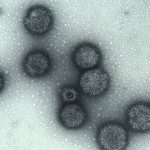Lien vers Pubmed [PMID] – 32500944
Lien DOI – 10.1111/tbed.13659
Transbound Emerg Dis 2020 Nov; 67(6): 2324-2328
After its first description in Wuhan (China), SARS-CoV-2 the agent of coronavirus disease 2019 (COVID-19) rapidly spread worldwide. Previous studies suggested that pets could be susceptible to SARS-CoV-2. Here, we investigated the putative infection by SARS-CoV-2 in 22 cats and 11 dogs from owners previously infected or suspected of being infected by SARS-CoV-2. For each animal, rectal, nasopharyngeal swabs and serum were taken. Swabs were submitted to RT-qPCR assays targeting 2 genes of SARS-CoV-2. All dogs were tested SARS-CoV-2 negative. One cat was tested positive by RT-qPCR on rectal swab. Nasopharyngeal swabs from this animal were tested negative. This cat showed mild respiratory and digestive signs. Serological analysis confirms the presence of antibodies against the SARS-CoV-2 in both serum samples taken 10 days apart. Genome sequence analysis revealed that the cat SARS-CoV-2 belongs to the phylogenetic clade A2a like most of the French human SARS-CoV-2. This study reports for the first time the natural infection of a cat in France (near Paris) probably through their owners. There is currently no evidence that cats can spread COVID-19 and owners should not abandon their pets or compromise their welfare.


